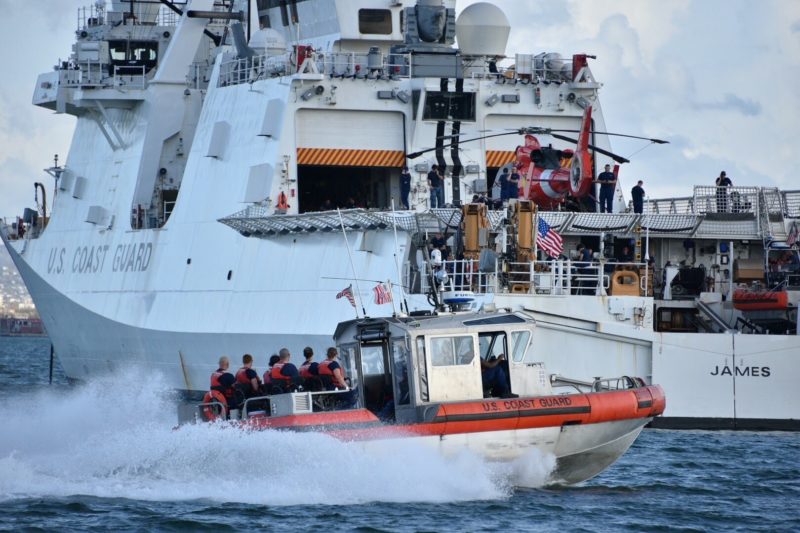Hurricane Maria churned as a category 1 storm off the mid-Atlantic states, contributing to drowning deaths on top of its more than 27 victims in the Caribbean.
With ports reopening, supplies moved into the harbors of Puerto Rico and the U.S. Virgin Islands, amid a mounting crisis of food and drinking water. Outside the White House Tuesday afternoon, Federal Emergency Management Agency chief Brock Long told reporters that 10 additional ships, including the Navy hospital ship Comfort, are heading to the islands.
The 894'x106' Comfort, homeported in Norfolk, Va., is to be underway by the end of the week. It can accommodate up to 1,000 patient beds, with operating and treatment facilities equal to a major metropolitan medical center, and a medical staff of nearly 1,000. Notable past deployments included the Hurricane Katrina response in 2005, and the mission to Haiti after the 2010 earthquake.
Critics of the Hurricane Maria response had urged deploying the Comfort immediately, with hospitals in Puerto Rico overwhelmed with patients and most without power. FEMA has moved in 4 million military meal-ready-to-eat (MRE) rations and 6 million liters of bottled water, but numerically only a day's supply for 3.4 million citizens across the territory.

The U.S. naval hospital ship Comfort. (U.S. Navy photo/ Bill Mesta.
However, the Department of Homeland Security denied a request to waive the Jones Act requirement for U.S-flag vessels to bring cargo to Puerto Rico from U.S. ports. On Monday, Rep. Nydia Velázquez, D-NY, whose New York City district has strong cultural ties to Puerto Rico, and Sen. John McCain, R-AZ, a longtime advocate of Jones Act reform, joined seven other members of Congress in asking for the waiver.
DHS granted waivers after hurricanes Harvey and Irma, in an effort to expedite fuel shipments to stricken states. But this time, U.S. Customs and Border Protection officials determined there is sufficient capacity available on U.S. flag vessels.
Puerto Rico shipper Crowley Maritime Corp. said it had more than 3,000 container loads of food and supplies landed at its San Juan, P.R., terminal with more on the way. But expediting local transportation and distribution on the ground is now key, said company officials.
“Once that begins to happen with greater frequency, we will need customers to unload and return empty containers so that we can bring more cargo to the island, which is suffering and in great need of life’s necessities,” said Jose “Pache” Ayala, Crowley vice president for Puerto Rico services.

The crew of the Coast Guard cutter Donald Horsley delivers food and water to the isalnd of Vieques. Coast Guard photo.
Crowley had bookings for another 2,700 containers to the islands, and secured additional warehouse space in Puerto Rico to help process and expedite delivery of needed supplies. On Sunday a Crowley logistics team dispatched 50 relief trucks to deliver relief supplies around the island, get them unloaded and returned for use bringing more supplies.
The company put five new container deck barges into service, with a combined capacity of more than 3,800 TEUS (20-foot equivalent containers units), along with accompanying tugs. The plan, company officials said, is to “operate continuously without a set schedule to get as much cargo to the island as quickly as possible and as many empty containers out of the island so that they can be returned with full loads.”
Crowley’s Isla Grande terminal in San Juan sustained only minor damage in the storm and Crowley began running its resupply effort out of Jacksonville, Fla., last week. But even then it was evident surface transport into the island interior would be a major problem.
“A key component to reopening the supply chain will be the availability of truck power to move the loads to their inland destinations and the ability of our customers to receive cargo,” said John Hourihan, Crowley senior vice president and general manager of Puerto Rico services. “With so much damage to infrastructure and facilities, this will be a challenge, but we remain optimistic about the resiliency of the people of Puerto Rico and their desire to do whatever is necessary to recover as quickly as possible.”
The National Hurricane Center forecasted Hurricane Maria would spin for another day or two east of North Carolina, where the Coast Guard imposed port condition Zulu to close traffic at Morehead City, N.C.




